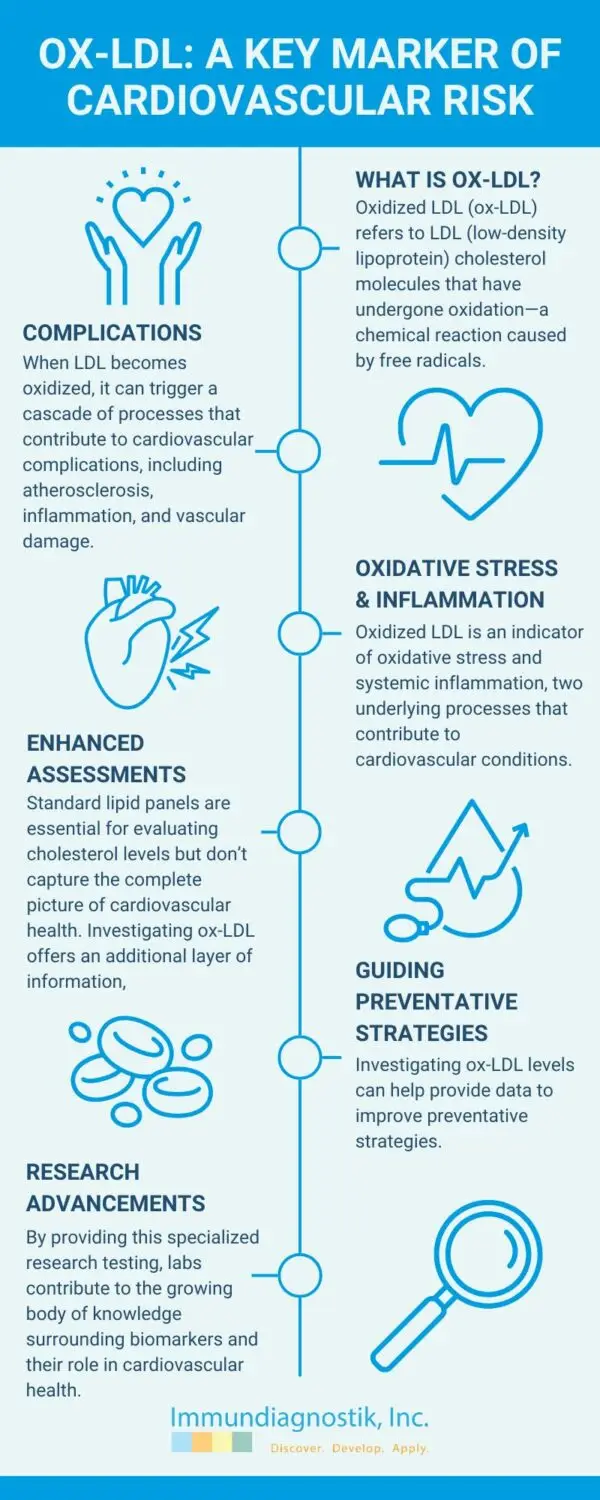Understanding the role of cardiovascular biomarkers is essential to assessing risks and guiding preventative strategies. Research shows one such biomarker, oxidized LDL (ox-LDL), has become a critical indicator of oxidative stress and inflammation—two key contributors to cardiovascular conditions.1 By measuring ox-LDL, your lab can contribute to advancing cardiovascular research.
Oxidized LDL (low-density lipoprotein) refers to LDL cholesterol molecules that have undergone oxidation—a chemical reaction caused by free radicals. This process transforms LDL into a more reactive form. LDL is often referred to as “bad cholesterol” because elevated levels are linked to the development of atherosclerosis, a condition characterized by the buildup of plaque in the arteries.
When LDL becomes oxidized, it can trigger a cascade of processes that contribute to cardiovascular complications, including:
Studies demonstrate that measuring ox-LDL levels can provide insights to help assess cardiovascular health.1-2 Here’s why it matters:
Oxidized LDL is an indicator of oxidative stress and systemic inflammation, two underlying processes that contribute to cardiovascular conditions. Elevated ox-LDL levels provide critical insights into cardiovascular health, independent of traditional cholesterol measurements.
Standard lipid panels are essential for evaluating cholesterol levels but don’t capture the complete picture of cardiovascular health. Measuring oxidized LDL offers an additional layer of information, helping identify individuals at higher risk for cardiovascular events.
Investigating ox-LDL levels can help provide data to improve preventative strategies. These strategies may include lifestyle changes, such as adopting a heart-healthy diet and increasing physical activity, as well as approaches to manage oxidative stress and inflammation.
Measuring ox-LDL enhances the role of laboratories in advancing cardiovascular health research. By investigating ox-LDL, labs contribute to the growing body of knowledge surrounding biomarkers and their role in health management.

One of the most reliable methods to measure ox-LDL levels is through enzyme-linked immunosorbent assay (ELISA). This method offers high specificity and sensitivity, making it a trusted tool for research applications. Implementing ox-LDL ELISA testing in your lab ensures accurate and reproducible results, supporting cardiovascular research with evidence to help make more informed decisions.
By offering oxidized LDL testing in research studies, your lab can provide valuable insights to help advance the understanding of cardiovascular risk.
Contact our team today to discover more.
Together, we can contribute to better cardiovascular health outcomes.
The ox-LDL ELISA is FDA Class 1 Exempt. For In Vitro Diagnostic Use.
For Laboratory Professional Use Only.
No content on this site, regardless of date, should ever be used as a substitute for direct medical advice from your doctor or other qualified clinician.